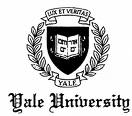My first seminar was on time management and study skills. However, we mostly learned about note taking. We learned how to "flow" an argument. This basically means writing down a fast-read argument extremely quickly using a combination of techniques such as the application of shorthand, symbols, and structure to your notes. We learned that we can use, and should, use this method not only for debating, but for every set of notes we take. This method seems like it is be extremely helpful to my note taking in the future.
The second seminar, although it did not discuss the demigod known as Winston Churchill, did have some good things to say on written advocacy. However, I had already learned what she was talking about from a teacher at El Cerrito! El Cerrito High School teaching the same methods as Yale? Score 1 for public education. The method was to be sure to avoid convoluting your essays with "meaningless words," as George Orwell would out it. The instructor asked us to read a George Orwell excerpt which condemned the disenfranchisement of the English language. He asserts that English rhetoric and literature has devolved into a convoluted mess used by politicians and writers alike. This convolution, Orwell asserts, is due to the surplus of meaningless words, usually adjectives, in the current use of the English language. he says that to illustrate your point more fully you have to show the reader that your argument is correct by techniques such as citing data or giving examples. This works much more effectively than simply telling someone your argument and backing it only with an adjective that solely represents your individual bias. For example, "The awesome Winston Churchill.. " does not prove anything about the awesomeness (yes, "awesomeness" somehow passes spellcheck as a legitimate word) of Churchill and the adjective "awesome" is a "meaningless word." However, if you say "Winston Churchill is awesome because he poses for pictures while holding Tommy guns and smoking cigars." you have illustrated your point using examples and given your argument more legitimacy. This is one of the most important rules of writing that I have leaned so far and I can not thank Mr. Jepson (AP Literature teacher at ECHS) enough for the valuable lesson.
We got a break tonight and got to watch a biography on Robert McNamara and study in our Marshall Briefing groups. However, I know you would disappointed if I told you we went through all this trouble to get me here and I have nothing to do at 2 o'clock in the morning. You guessed, I have to get back to studying and doing some "homework."
Thanks for reading!





Matt,
ReplyDeleteHow did the seminar sign-up get screwed up? Did they pull some sort of bait and switch on you? I mean, just as you were about to put your name on the paper did they distract you and slip a substitute in its place?
At least you got something out of the substitute seminar.
----------
Taking notes so they can be of use to you later is a rare skill. I take excellent notes but when I go back to them later I’m not sure what language they’re written on, whether the note taker was on drugs and even if they’re from the same meeting I was in. I was shocked at reading Yohanna’s posted notes from your first day. Not only were they voluminous but readable and understandable. She’s the kind of partner I want when setting up a study group.
----------
I understand that you may still be in awe of the big fancy Ivy League school (Yale) but maybe you have it backwards. Maybe ECHS isn’t teaching the same methods that Yale teaches—maybe Yale is teaching something that ECHS teaches. Now the question might be: who’s copying whom?
----------
The argument about the misuse of adjectives is a good and valid point. They’re similar to the overuse of swear words in that they’re the crutch of a weak and poorly informed mind. A better educated and trained author might be more selective with their words to get their points across.
At the same time, sometimes these words can effectively be used for emphasis.
----------
Just curious what the name of the McNamara bio was. The recently made The Fog of War was very good and helped to explain an important part of our history. Allowing the architect of that part of history to speak about it, provide commentary and even reflections was invaluable. I also know that the History Channel did a nice bio on McNamara.